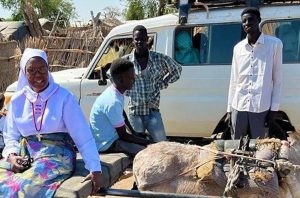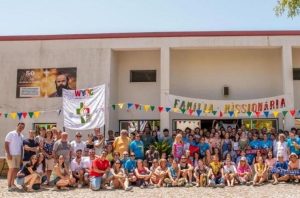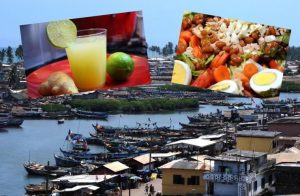He received the appointment as auxiliary bishop with “fear and trembling”. But with a great desire to serve the church. We spoke about it with the Combonian Msgr. António Manuel Bogaio Constantino was recently consecrated as auxiliary bishop of the Archdiocese of Beira.
The archdiocese includes the entire province of Sofala in the central part of Mozambique. Within Sofala is the city of Beira the second most important city in the country, where the cathedral of Our Lady of the Rosary is located. The territory is divided into 46 parishes.
The new auxiliary bishop, originally from Tete, was ordained a priest on 13 June 2001 in Beira and has so far been provincial superior of the Comboni Missionaries of the Heart of Jesus (since 2016) and president of the Conference of Religious in Mozambique (since 2018).
After completing his postulancy with the Comboni Missionaries in Nampula and attending the seminary in Matola, he carried out his novitiate in Uganda. On 10 May 1997, he made his first vows in Kampala and subsequently obtained a baccalaureate in theology at the Pontifical Gregorian University in Rome. After his ordination (from 2001 to 2007) he graduated in journalism in Madrid, Spain.
Having returned to Mozambique, he was appointed parish priest of Anchilo, in the archdiocese of Nampula, and collaborator at the Catechetical Centre of Anchilo (2008-2011), and subsequently parish priest of São João XXIII in Chitima and of Santa Maria in Mucumbura, in the diocese of Tete (2011- 2016).
Pope Francis appointed him Auxiliary Bishop of the Archdiocese of Beira last December. The episcopal consecration took place on 19 February with a solemn celebration in the Multipurpose Pavilion of the Ferroviário in Beira. In his first speech as bishop, Msgr. Bogaio Constantino explained that he received the noble, thorny and demanding mission of pastor with “fear and trembling”, moved by the desire to “Serve, serve and serve the Church”.
What are the major challenges you will encounter in Beira in the exercise of your ministry?
Although originally from Beira, I have lived far from my city for 30 years, returning only occasionally. During this time, both the Church and Mozambique have experienced a great transformation. I have therefore not given myself any kind of agenda or planning, let alone any special goal. The local Church has grown and matured a lot. I feel that I simply have to enter it with a sense of openness, a desire to learn and above all with a missionary spirit in the service of the people of God. The greatest challenge is to help believers, and young people in particular, to consolidate their faith in a time when it is put to the test by modernity and by the attraction towards the many religious formations that have arisen over the years. I believe, however, that only after some time from my entry will I be able to better define and face today’s challenges. Moreover, the archdiocese has already given itself a clear pastoral plan: I undertake to study it so as to give my contribution to its implementation.
How do you view your future mission in your ministry as a bishop?
Evangelization and the first proclamation of the Gospel is the specific vocation of the Comboni Missionaries. My ministry in Beira will therefore have at its centre the announcement and the importance of the missionary dimension and therefore of the commitment of every Christian to be a promoter, speaker and witness of the Gospel, also promoting the ability to work united and in communion. With Archbishop Claudio Dalla Zuanna I will follow the pastoral path he has already outlined in the pastoral plan of the diocese. In fact, the Beira region too is feeling the effects of the climate of general instability, and I think we are called to stimulate not only the Christian communities but the whole of society to recover the moral value of non-violence and a commitment to peace.
What does it mean for you to be a Comboni missionary bishop?
Enormous work has been done by the Comboni Missionaries since their arrival in Mozambique (1946) and their generosity is truly inimitable. Today the local Churches, including Beira, have developed a lot and on the ministerial level they have very committed and valid native priests, religious and lay people. Missionary institutes therefore pass from the role of protagonists to offer support and encouragement alongside local pastoral workers. My satisfaction is great in seeing that the work of the Comboni Missionaries has contributed in an important way to the growth of the Christian communities in Mozambique, and so fulfils the dream of our founder, St. Daniel Comboni, of “regenerating Africa through the Africans”.
What specific contribution can you make to the local Church?
As I have already mentioned, my greatest satisfaction is to recognize the level of maturity reached by the Church. The pastoral fruits of so many years of work are confirmed by the many vocations and the numerous lay ministries exercised in the Christian communities. In fact, I must say that in the difficult years after independence, the great challenges posed to the Church contributed to an enormous flowering of ecclesial activities and above all to the flowering of the charisms of the laity. In many parishes, they ended up replacing foreign priests in every area, who in many cases had had to leave the parishes and the country. I think that today we must in some ways recover that pastoral dynamic that has been somewhat lost, such as small Christian communities, where the laity truly put to good use the gifts that the Spirit grants them for the benefit of the whole community. And to live in a missionary spirit, that is, constantly going out of oneself, announcing and bearing witness to one’s faith with concrete life.
Pope Francis speaks of an “outgoing Church” and of active, synodal participation, capable of involving all the faithful.
The process of preparation for the synod which will be celebrated next autumn is continuing more or less intensely in all the dioceses. The themes suggested by Pope Francis are truly stimulating: communion, participation and mission. In them, the trajectory to be followed for the great celebration on a universal level is outlined. The second phase, i.e., on a continental level, has begun in Beira after the results of the consultation of all the ecclesial realities in the first diocesan phase were sent to Rome. I will do everything to join immediately in the synodal journey and offer my contribution so that it truly becomes a moment of ecclesial renewal and the reawakening of faith in all Christians. I firmly believe that the Lord wants to use me to help the Church in Beira to experience more and more the beauty of ecclesial communion.









